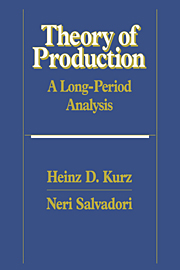Book contents
- Frontmatter
- Contents
- Preface
- A reader's guide
- 1 Free competition and long-period positions
- 2 A one-commodity model
- 3 Two-commodity models
- 4 Models with any number of commodities
- 5 Choice of technique
- 6 Alternative descriptions of a technique
- 7 Fixed capital
- 8 Joint production
- 9 Jointly utilized machines
- 10 Land
- 11 Persistent wage and profit rate differentials
- 12 On limits to the long-period method
- 13 Production as a circular flow and the concept of surplus
- 14 The neoclassical theory of distribution and the problem of capital
- 15 On some alternative theories of distribution
- Mathematical appendix
- References
- Name index
- Subject index
1 - Free competition and long-period positions
Published online by Cambridge University Press: 06 January 2010
- Frontmatter
- Contents
- Preface
- A reader's guide
- 1 Free competition and long-period positions
- 2 A one-commodity model
- 3 Two-commodity models
- 4 Models with any number of commodities
- 5 Choice of technique
- 6 Alternative descriptions of a technique
- 7 Fixed capital
- 8 Joint production
- 9 Jointly utilized machines
- 10 Land
- 11 Persistent wage and profit rate differentials
- 12 On limits to the long-period method
- 13 Production as a circular flow and the concept of surplus
- 14 The neoclassical theory of distribution and the problem of capital
- 15 On some alternative theories of distribution
- Mathematical appendix
- References
- Name index
- Subject index
Summary
This book is concerned primarily with the investigation of economic systems that are characterized by a uniform rate of profit and uniform rates of remuneration for each particular kind of “primary” input in the production process, such as different kinds of labor and natural resources. These economic systems and the corresponding prices are to be understood as reflecting characteristic features of a capitalist market economy in an ideal way: they express the pure logic of the relationship between value and distribution in such an economic system. The prices are taken to fulfil the condition of reproduction: they allow producers to cover just costs of production (including, as things may be, the provisions of the producers and profits at the “ordinary” rate of return on the value of capital advanced at the beginning of the uniform period of production). These prices have aptly been called “prices of production”; we might also talk of “prices of reproduction.”
The classical as well as the early neoclassical economists did not consider these prices as purely ideal or theoretical; they saw them rather as “centers of gravitation,” or “attractors,” of actual or market prices. In their view a tendency toward a uniform rate of profit (and uniform rates of remuneration paid to the proprietors of the different primary factors of production) would prevail in the presence of free competition, that is, in the absence of significant and lasting barriers to entry or exit.
- Type
- Chapter
- Information
- Theory of ProductionA Long-Period Analysis, pp. 1 - 41Publisher: Cambridge University PressPrint publication year: 1995



